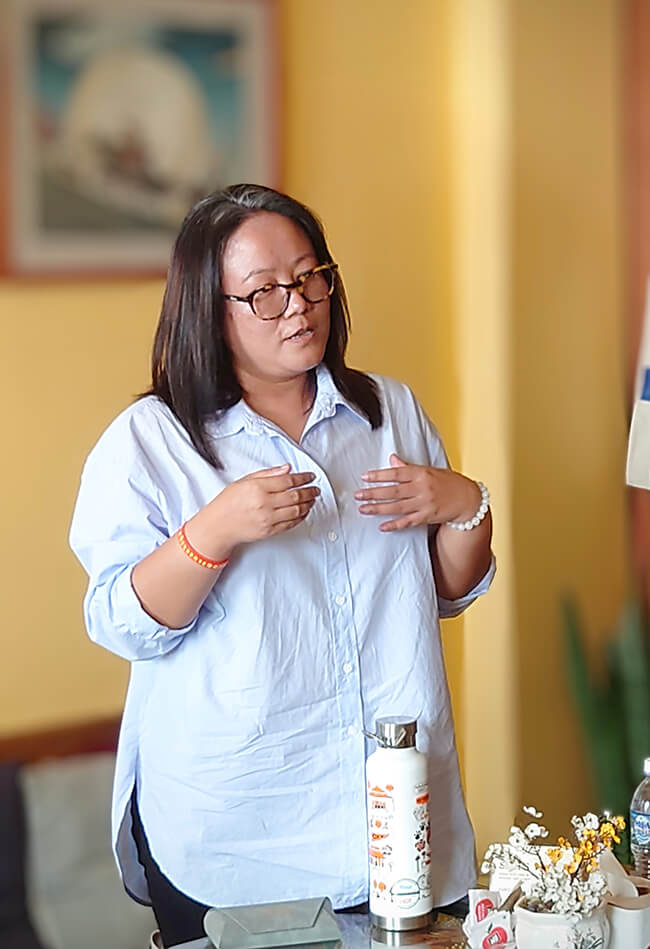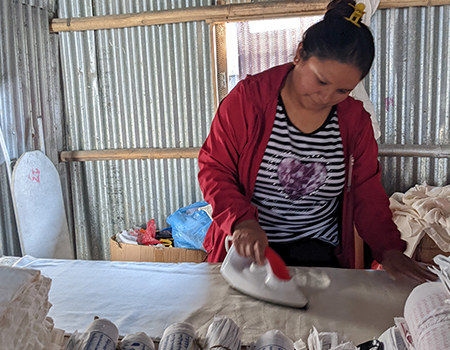Although modest in numbers, Ang Dolma Sherpa’s sustainable, bio-degradable products are ‘flagging’ the beginning of a cultural change in the country.

Talking with Ang Dolma Sherpa, the three driving forces in her life become clear: her Buddhist faith — a part of the Sherpa heritage, her roles as a producer of prayer flags and khata (votive scarves), and as an educator in the harsh reality of climate change.
She founded Utpala Craft in 2011 — utpala is Sanskrit for that quintessential Buddhist flower, the lotus — after the funeral of her father, who was tragically killed in a traffic accident. His cremation unexpectedly focused her attention on khata. During his cremation, Ang Dolma became acutely aware of a noxious smell in the air. “Just like the burning of plastic bags and bottles,” she recollects. “When I found out that the smell came from incinerating the scarves, combined with the emotion of my father’s funeral, I was horrified.”
Consequently, Ang Dolma started to think about solving the problem. Any attempt to stop using khata altogether was doomed to failure: the votive scarves are embedded in Nepali culture and an integral part of the traditions of the Sherpa and other Mongolian ethnic groups. Looking for an alternative, Ang Dolma researched the history of khata.
Initially, white, pure cotton khatas were the norm. But in the early 1980s, people started using coloured khata in synthetic fabrics, such as polyester and nylon. Ang found images of fine, cheesecloth-type khata dipped in starch to give them the required degree of stiffness, with the undesirable result that the recipients’ clothes became covered in fine white powder.
Dalai Lama once declared that Buddha “would be green” if he were to be reincarnated.
Prayer flags—or lung ta—have experienced the same fundamental shift in their concept and production, from homemade wood-block prints on white cotton to mass-produced synthetic fabrics in the now-favourite colour sequence of blue, white, red, green, and yellow.
Ang Dolma’s interest in the ethics and practices of making a positive choice for products that create minimal rubbish and the concept of waste management dates to her childhood days in Asan Tole, in Kathmandu. “My mother would rarely use packet noodles or give us cartons of juice because of the garbage they created,” Ang Sherpa recalls. “She was particularly vocal on the issue of khata wastage.”
As a devout Buddhist, she was also encouraged to develop her plans by the commitment of her religion’s spiritual leaders to environmental issues. The Dalai Lama once declared that Buddha “would be green” if he were to be reincarnated. He became a staunch supporter of the 2015 Paris Accord, an international treaty on climate change. “What happens on this blue planet affects us all. It is not sufficient to just express views and hold conferences. We must set a timetable for change.”
When she and her mother started a pilot project to make old-fashioned, biodegradable white cotton khata, they were confronted with the problem of manufacturing the minimum quantities—three to four thousand items—that most textile wholesalers were asking for. It took them a long time and a modest investment of 100 US dollars to deliver the first batch of one hundred black-and-white old-style khata. Since then, their business has experienced ups and downs. One pivotal moment was meeting Dawa Yangzum Sherpa, an Everest summiteer and the first Nepali woman to be awarded certification by the International Federation of Mountain Guides. The photograph of her displaying Ang Dolma’s flags in the vicinity of Tso Rolpa meant a significant step forward in raising awareness of the issues involved.
However, the company also had to deal with the spread of COVID-19 and the associated lockdowns and restrictions on movement. The pandemic had an impact on Ang Dolma and her newly established company. She recalls it as a mainly positive time. “I like being alone anyway, so being isolated did not affect me. I lived in Patan, and people were free to roam along the old alleyways. COVID gave me time to think in depth about so many issues.”
Another highlight in her career was when the great chorten of Boudhanath was stripped of its usual nylon strings of synthetic coloured prayer flags and was serenely decked out in pure white biodegradable alternatives strung on jute. That was in December 2021. “I was scared of what I was doing,” Ang Sherpa admits. However, the comments were primarily positive, although the habit of using synthetic flags persisted. “I believe in slow growth that will be sustainable. I don’t want to impose on people. I want to inspire, not impose.”
Utpala Craft’s production figures are modestly impressive. A workforce of eighteen people, primarily women, produces around 13,000 khata and 4,000 strings of prayer flags in two sizes.

They market at prices that people can afford. “It is important that people do not hesitate too much to buy them due to the price tag.” She regards her initiative as part of a growing trend to change how local people choose, consume, and dispose of products. Her primary target market is certainly not overseas.
“At some point, when others are producing biodegradable khata and prayer flags, I want to leave production and move on to recycling the biodegradable khata. That is my ultimate goal,” she states with a radiant smile, “Since I established Utpala Craft, the needless anxiety in my life is gone. I am happy doing the work that has chosen me!”
Louisa Kamal is a regular contributor to Nepal Connect.




